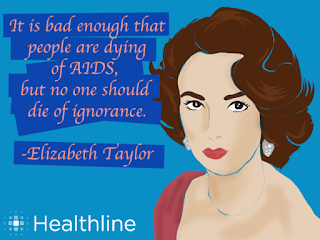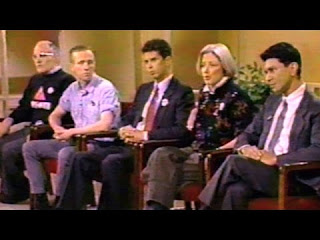Punch line: AIDS
This 'joke' was told to me at work. Let's translate: How do you kill a homosexual? Punch line: AIDS.
*In the state of New York, 80% of newly diagnosed AIDS patients lived in New York City
*100,000 New Yorkers have died of HIV/AIDS related causes
*Men who have sex with men make up 4% of the US male population, but account for almost 78% of all new HIV infection
*93% of new HIV/AIDS diagnoses among females in New York City were in black or Latina women in the first half of 2011.
I'm begging you; show me the funny.
It was the summer of 2013. I had been employed at this cheesy midtown restaurant for almost a year. Long enough to know the in's and out's, but still unknown to the hire up's. It was the best shitty job I'd ever had, in the heart of Manhattan.
This 'joke' was being recited by a co-worker, who heard it from a cook who told it on a cigarette break. I immediately interpreted the 'joke' on a literal level; my reaction was visceral. I was both underwhelmed and disturbed at the hamburger-helpers I called peers who felt it appropriate to recite the slur. The verbal indignity was re-told in a very hush-hush, "I can't believe he said that, but isn't it funny?" manner. Even still, my disgust was targeted solely towards the cook. Was he making fun of queers or AIDS patients? Was anyone aware that the insult reiterated the myth that AIDS was a gay disease? The vacant space where his brain should have been found humor in that 'joke'. Apparently I was supposed to find the humor as well. Of course I let each moron within that circle know their humor lacked both compassion and comedy. And, of course, I stormed off knowing my scolding did the situation no justice.
I wanted heads to roll and knew exactly how to do it. By the time I got home at the end of my shift, I had drafted a 608-word, scathing email aching to be proofread and cc'd to anyone who had an iota of pull within the company. My words were sharp and abrasive with a hint of threat. I stated facts. I noted breached rules and regulations from the employee handbook. I suggested diversity training. And then, I waited.
While action was made (he was terminated within 72 hours), it had been done in silence with no warning to follow. One day the prick was at work. The next day he wasn't. No diversity classes. No reiteration of corporate conduct and ethics. No lesson.
Whispers turned into bold-faced accusations. By the end of the week there were a substantial amount of supporters of the 86'd cook. That zero-tolerance stance I took upon first hearing the 'joke' lead many to figure out I was the whistle-blower. The cold shoulders were relentless, as was the backhanded commentary. "Uh oh, Tamela's here. Everybody watch what you say before that girl gets you fired." Once, while having a simple difference of opinion with a co-worker she quipped, "Even if you're wrong, you're right. Please, please, don't get me fired!" Ironically, the consequence the prick paid for his own actions far outweighed the action that actually caused such consequence.
As time past, the termination scandal dissipated. By the time Christmas rolled around it felt as though the incident was a million miles away. Until it happened. She happened. Justine Sacco.
In route to Africa, Sacco made a vile 'joke' about being immune to AIDS because she's not a black African. Humor as cruel and ignorant as the one that prick told. However, there were more than just a few ears listening during a cigarette break. She broadcasted her Trumpesque humor for all the Twitter world to re-tweet. Sacco's consequence, by far, eclipsed that of the ex-cook. She wasn't just fired. By the time her feet touched African soil her
I used to think there would always be fool-proof gratification in seeing justice served. However, when the motive is misplaced or the lesson is lost, who's winning? Even if Justine Sacco evolved into an intellectual space that allowed her to understand the hurt and damage in that loaded gun she tweeted, her resentment towards those who rallied for her demise blares over her redemption song. Just as I assume that prick spends more time thinking about the bitch who got him fired than thinking about how hurt that bitch must of been that someone would mock a pandemic that's taken 40 million lives (and counting).
People have long-been comfortable with joking about AIDS. In their minds it has nothing to do with them. AIDS is little more than a punch line as far as popular culture is concerned.
It's easy to laugh at strangers when we've convinced ourselves that they're in a land far, far away; too distant to provoke care or compassion. This ill-willed mindset not only encourages the stigma to grow, it eggs it on. Taking a pandemic and talking it down to a punch line is a defense mechanism that comforts many in the high-risk category. Believe it or not, there are many ignorant victims in this world convinced that as long as they're not checking a homosexual and/or substance abuse box, they're in the clear. If only those who laughed at AIDS knew exactly how at-risk they are, I assure you they would not be laughing. Ironically, if those who are at high-risk knew what that risk meant, as well as why the odds are so high against them, their personal fear and concern would dramatically reduce the risks and leave little room for humor.
I'm sure there are many who are still committed to the old adage, "Sticks and stones may break my bones" (if one more person tells me, 'but it was just a joke', I'm probably going to vaporize them). It's easy to follow that chant until you're the one who loses your job, your kids, your dignity, or your privacy because you contracted a chronic illness. Who gets the last laugh then?
There are HIV positive people living in New York that have the same chance as anyone else to live long, healthy lives. But, they'll never know because we're laughing them out of the waiting rooms. Can you believe that there are people who willingly decline FREE HIV/AIDS testing? Too scared to know (insert sad face here).
The correlation between that prick's circumstances, as well as Sacco's, as well as many, many, many others is the fact that the space to educate those too desensitized to pass up laughing took a backseat to blaming/shaming the ignorant. In my experience, I was the one on the blame/shame end of the stick, unlike Sacco who had to carry the consequence of an ignorant culture on her own.
I do not endorse the public shaming of any individual for something said. But, not for any righteous or humbling reason. Simply because, it's a fucking distraction. I'd give less than two shits about morons telling bad jokes if it weren't for the fact that the humor is killing us. Literally. People are dying. All over the world. Of AIDS. Babies. Children. People. We're not going to accomplish anything by going after the wrong target.
One night, while downing craft beers and Fireball with a co-worker, he finally asked the question he and many other's wanted answered.
"Why'd you have to get him fired? I mean... he really wasn't a bad guy. And, it was just a joke." He proceeded to inform me that many people sympathized with the terminated supervisor, mainly because he was soon-to-be married and needed his job to pay for wedding expenses.
"There's no such thing as a funny AIDS joke," I responded after a moment's pause. I then said things that, until that moment, had been unsaid. "More than two-third's of my loved ones are gay, and more than a handful are HIV positive. I just can't stop thinking about what that joke would do to them, how it would make them feel if they heard it. I think about that and it makes my skin crawl." We continued to debate about stigmas, consequence, and general opinion.
In the end, my email didn't change the way popular culture addresses the lack of compassion, understanding, and logic towards those with AIDS. And, while I take no pride in the loss of someone's wages, I'll never regret taking a stand. It's going to take a lot of people, a lot of emails, and a lot of, "That shit's not funny bro," before the masses wise up. The only way to kill the stigma is by changing the narrative. If there's one lesson I took from my experiences with AIDS 'jokes' it's that it's more important to shame the humor and the narrative than it is to shame the individual sharing it. The prick who got fired, along with Justine Sacco are nothing more than ignorant victims who've got a lot to learn.
*statistics compiled by New York City Aids Memorial January 2013


